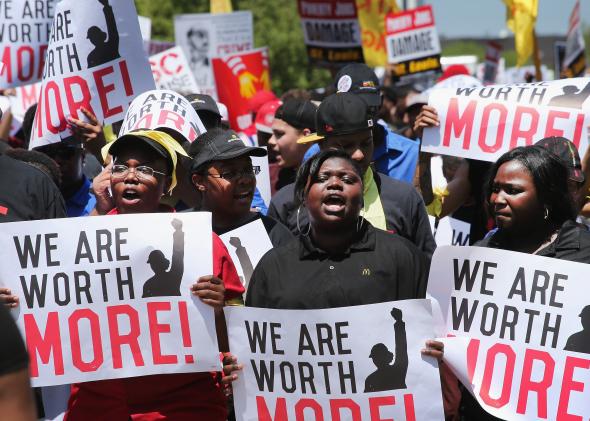The Fast-Food Strikes Have Been a Stunning Success for Organized Labor
http://www.slate.com/blogs/moneybox/2014/09/07/the_fast_food_strikes_a_stunning_success_for_organized_labor.html

Fast food workers and activists demonstrate outside the McDonald’s corporate campus in May.
Photo by Scott Olson/Getty Images
By Jordan Weissmann SEPT. 7 2014 8:00 PM
For the seventh time in nearly two years, fast food workers around the country walked out of their restaurants last week to demand a pay raise to $15 per hour and the right to unionize. In New York City, 21 workers were arrested for sitting in the middle of the street outside the McDonald’s in Times Square. Organizers said more than 50 protesters were arrested for similar acts of civil disobedience in Detroit. Another 50 were detained in Chicago.
And so the most interesting—and most successful—American labor push in recent memory rolls on. The strikes, which began in November 2012, have been organized by the group Fast Food Forward and bankrolled by the Service Employees International Union, which according to the New York Times has spent more than $10 million on the cause. These walkouts haven’t led to any unionized McDonald’s or Taco Bell franchises yet. But at this early date, it’s more useful to think of them as the spearhead of a broader living wage movement that has also seen retail workers at stores such as Walmart protest for better pay. Framed that way, the effort has been startlingly effective. For the cost of a few Super Bowl ads, the SEIU and some dedicated fast food workers have managed to completely rewire how the public and politicians thinks about wages.
Consider the numbers. Over roughly the past two years, 13 states have increased their minimum wage, as have 10 city and county governments, according to a tally by NBC News. Seattle voted to raise its citywide minimum to $15 an hour by 2018; San Francisco residents will vote on whether to do the same in November. The mayors of New York, Los Angeles, and Chicago have all backed a $13 wage floor. The president has come out in favor of a $10.10 national minimum. And just in case you were looking for a rough barometer of overall public interest in the issue, even Google searches for the phrase “minimum wage” have been consistently more common since the start of 2013. You don’t have to think a $15 minimum wage is a brilliant idea (personally, I don’t) to admire the efficacy of the effort.
All this has transpired at a time when organized labor has had little else to celebrate. The Tea Party wave of 2010 brought anti-union right-to-work laws to the industrial Midwest. The United Auto Workers’ longstanding dream of organizing a foreign car-maker in the South suffered yet another crushing setback when employees at a Tennessee Volkswagen plant voted against joining the union. Overall, union membership has continued its long decline.
FULL story and chart at link.

